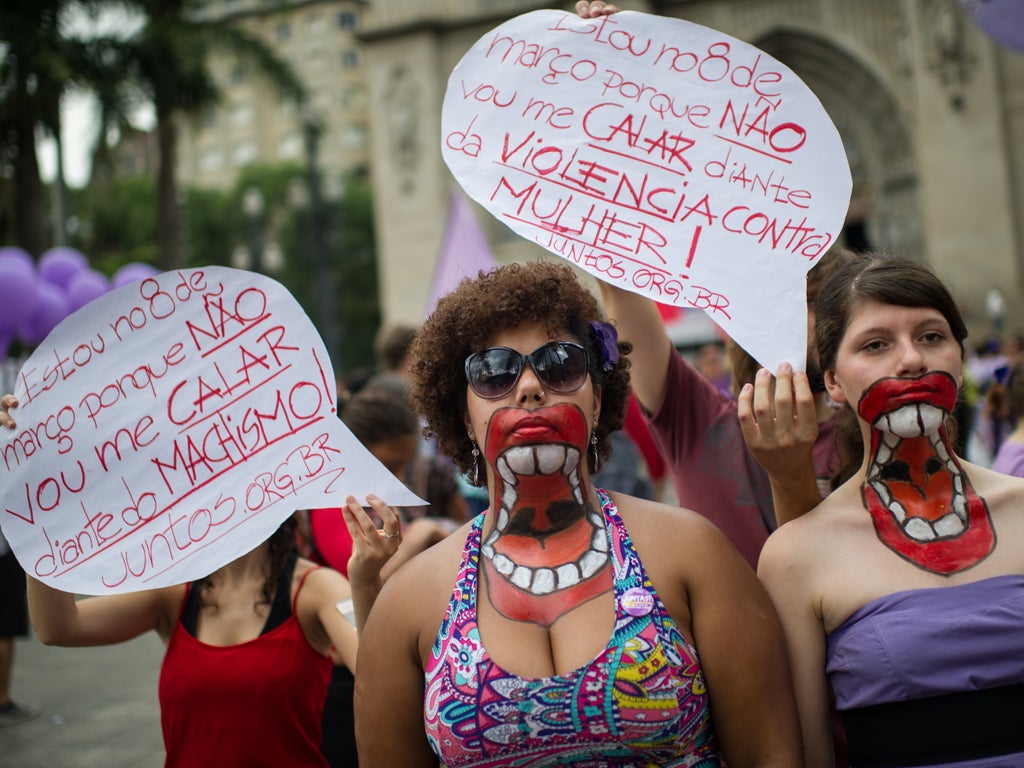Violence and women in Brazil: What happens indoors stays indoors
Over the past thirty years nearly 100,000 women have been killed inside their homes

Your support helps us to tell the story
From reproductive rights to climate change to Big Tech, The Independent is on the ground when the story is developing. Whether it's investigating the financials of Elon Musk's pro-Trump PAC or producing our latest documentary, 'The A Word', which shines a light on the American women fighting for reproductive rights, we know how important it is to parse out the facts from the messaging.
At such a critical moment in US history, we need reporters on the ground. Your donation allows us to keep sending journalists to speak to both sides of the story.
The Independent is trusted by Americans across the entire political spectrum. And unlike many other quality news outlets, we choose not to lock Americans out of our reporting and analysis with paywalls. We believe quality journalism should be available to everyone, paid for by those who can afford it.
Your support makes all the difference.Brazil, a vibrant country of celebration and colour, hides a dark secret.
Recent statistics show that every 15 seconds a woman is assaulted; every two hours a woman is murdered; 59 per cent of people know a woman who has been a victim of violence; and 65 per cent of attacks on women happened behind closed doors. It has the seventh highest rate of violence against women in the world and within the past three decades, at least 92,000 women have been killed inside their homes.
Recently, we’ve been urging President Dilma Rouseff to pass the PLC3/2013 bill, which recognises the violence experienced by both men and women in Brazil, especially those who’ve experienced sexual violence. Women’s rights are especially important, as they are more likely to require medical assistance and a woman’s right to abortion, for example, is a contentious issue. There are many influential conservative church groups throughout the country who strongly oppose the idea that a woman should have the right to abortion after being sexually assaulted, because it is believed it could lead to terminations being legitimised, and they consequently lobbied against this bill. We campaigned for the rights of all abused women, surprising many onlookers as we’re a church ourselves.
The law has now been passed, and this is a definite breakthrough in terms to recognising the violence faced by many Brazilian women, but it’s an issue that, although common in our country, is largely ignored.
In 2006, the Maria da Penha Law – considered one of the most extraordinary advances in recent years in our country – was introduced to punish men who attack their partners, or ex-partners, and forced the Brazilian government to establish public services to protect victims of domestic violence, including special police and legal courts. This law also helped to establish that the crimes aren’t just the sexual assaults, but there are also cultural, psychological and moral issues that go hand-in-hand with them. It is these secondary issues that can often lead to beatings and even murder.
But in our society, people don’t talk about this issue. What happens indoors stays indoors.
I have been working alongside other women’s rights campaigners to encourage churches in Brazil to stand up and fight this pandemic of violence against women.
The Anglican Service of Diakonia and Development (SADD) has been campaigning for the rights of all people since 2008, and have worked hard to make people aware of the violence that surrounds them, working with church groups and communities alike. We’ve handed out booklets to ensure they recognize that violence against women is a human rights violation - it’s a sin against everyone, not just women - and by closing our eyes and letting it happen, we’re legitimizing the violence.
Yet, our campaign hasn’t been easy.
In a society fuelled by machismo, there is quite a lot of resistance from the police and this is an issue we continue to work hard to combat. But we continue our battle to reaffirm the importance of public policies that can guarantee a full life for all women and effectively prevent gender-based violence. I really believe that through our work we can open up the eyes of fellow citizens around the country to fight for women’s rights. As church community members become aware of the violence suffered by their women, there will no longer be silence and I hope the perpetrators will be condemned. If we can end the silence and denial, we will be victorious in the fight against violence against women.
Join our commenting forum
Join thought-provoking conversations, follow other Independent readers and see their replies
Comments